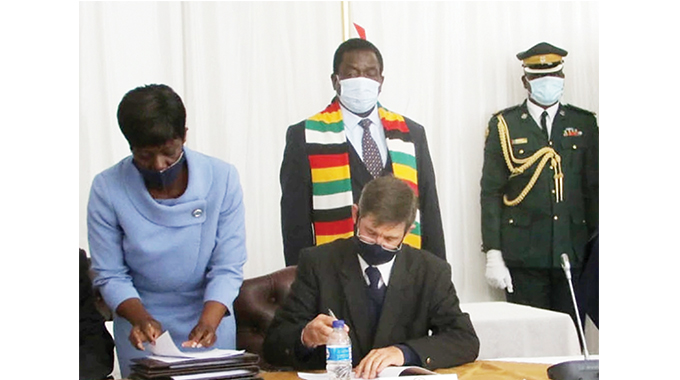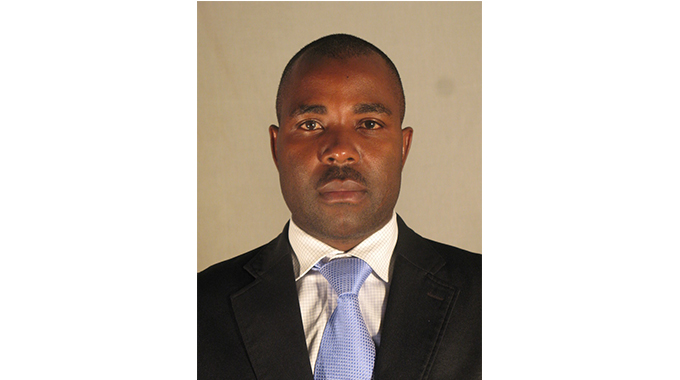Zim’s 2nd Republic delivers on promises

Prosperity Mzila, Correspondent
Zimbabwe has been going through an onslaught of attacks from the purported friends and foes alike, ever since it signed the Global Compensation Deed Agreement (GCDA), with the former white farmers.
It is sometimes prudent for whoever feels an injustice has been done to seek clarity before throwing stones.
Zimbabwe has not gone back on its Land Reform Programme by signing this GCDA, but rather has sealed the transaction according to the country’s constitution, but most importantly Zanu-PF as a party has fulfilled their Election Manifesto promise, which among others was to bring finality to the land reform programme.
Zanu-PF under the stewardship of 1st Secretary and President Emmerson Mnangagwa, has taken it upon itself to fulfil promises made without procrastinating.
Political parties make a lot of promises when they seek to enter into office, and when elected, they forget to go back and revisit their promises.
When President Mnangagwa was campaigning for office, he made promises to be different from his predecessor and made an oath to implement his promises. His party Zanu-PF in crafting its election manifesto made a point to align it with the country’s Constitution.
Zanu-PF knew how people participated in the drafting of the Constitution and basing on that directed his party to align all Manifesto promises to the Constitution. And so the land question was addressed therein.
Section 72 sub-section(3)(a) states that where agricultural land or any right of interest in such land is, compulsorily acquired for a purpose referred to Subsection (2)(a) No compensation is payable in respect of its acquisition, except for improvements effected on it before its acquisition.
Categorically making it clear, that there is no reverse to the land reform programme, the Zanu-Pf Manifesto then sought to bring to finality that issue by committing to pay the compensation. It is clearly written in black and white in the Zanu-PF election Manifesto, “Compensating former white farmers inline with the provisions of our National Constitution,” reads part of the 2018 election Manifesto.
It is this commitment that drove the 2nd Republic to sign a binding Global Compensation Deed Agreement with the former white farmers, as articulated by President Mnangagwa in his own words while addressing a Zanu-Pf youth Assembly in Harare, when he said, “In agriculture, the land reform is irreversible and Section 72 of the Constitution is very clear in this regard.
“However, the same Constitution provides that no compensation is payable in respect of its acquisition, except for improvements effected on the land before its acquisition.”
So for the leader of a South African opposition party, Julius Sello Malema, to make comments on Zimbabwe land issues that he knows nothing about is rather appalling, especially considering that his own black South African people are without land, while their former colonisers still own vast tracts of land 24 years after attaining independence.
Zimbabwean people now own their land and means of production, they might be on a learning curve in farming issues, but they have managed to match up to the former commercial farmers.
In 1998 the former commercial farmers managed to deliver 260 million kilogrammes to the auction floor, and in 2019 despite the erratic weather patterns the new black farmers managed to deliver 258 million kilogrammes, while in 2018, they had delivered 253 million kilogrammes.
Zimbabwe has managed to hold its position as the biggest tobacco producer in Africa and fifth in the world.
When the late Morgan Tsvangirai and his MDC party advocated for sanctions on Zimbabwe with his minions Tendai Biti and Dhewa Mavinga, one of the conditions to remove sanctions on Zimbabwe was for Government to honour the compensation of the white commercial farmers for improvements they had made on the land.
President Mnangagwa realised that to ensure sanctions that have brought Zimbabwe to its knees are removed, he had to fulfil, the requirements of the Constitutions, the ZIDERA conditions and the Manifesto promises by addressing the compensation issue.
During his inauguration in August of 2018, President Mnangagwa did say that the 2nd Republic was going to hit the ground running, and true to his word, he has been implementing his promises since then.
He promised to build the Harare- Beitbridge road, and he is doing it, great works along that route, the Harare-Chirundu highways is also being redone by our very own engineers.
The fight against corruption was one of the priorities in the Manifesto, and as soon as the 2nd Republic set foot in office, all corrupt high profile government officials self-exiled themselves for fear of being brought to book. Those that remained faced the music of their actions.
The Auditor General also helped a great deal to the achievement of that goal.
The law did catch up with some Cabinet Ministers on corruption charges and they lost their jobs, something which was alien during the time of the late former president Robert Mugabe.
One of the promises that is enshrined in the Manifesto is to grow the Zimbabwean economy, through building investor confidence, and opening up Zimbabwe for business.
The Zimbabwe is open for business mantra is being propagated throughout the globe and investors are responding with interest.
Notwithstanding an opposition that has always shown a propensity work against their own, destroying the country’s prospects, by inviting doom to befall all of us, through staged civil disobedience among other theatrics. Their stage-managed theatrics have been aimed at destroying investor confidence, sending a picture that there is no political stability. This operation they dubbed ‘Kudirira jecha musadza” we will pour sand in the porridge and let’s see if you will be able to eat it, Chamisa declared.
Despite all that, the President and Government stuck to their guns, moving forward fulfilling their Manifesto promises, instituting reforms such as introducing the Freedom to Information Act that repelled the Access to Information and Protection of Privacy Act (AIPPA) for the betterment of Zimbabweans.
Meanwhile, the Government continues with its bid to mend relations by paving the road to engagement and re-engagement. This had not been easy since some of the countries being approached for re-engagement have vested interests on Zimbabwe and will try and make it difficult to foster a relationship with Zimbabwe.
However, Zimbabwe is blessed with a President who is patient, slow to offence and as soft as wool, these traits give confidence that Zimbabwe will soon build a relationship with its erstwhile friends.
President Mnangagwa’s administration will continue forging ahead in fulfilment of its vision 2030 of making the country a middle income economy and all progressive Zimbabweans are invited to join along this journey, which is not going to be easy, but achievable.








Comments